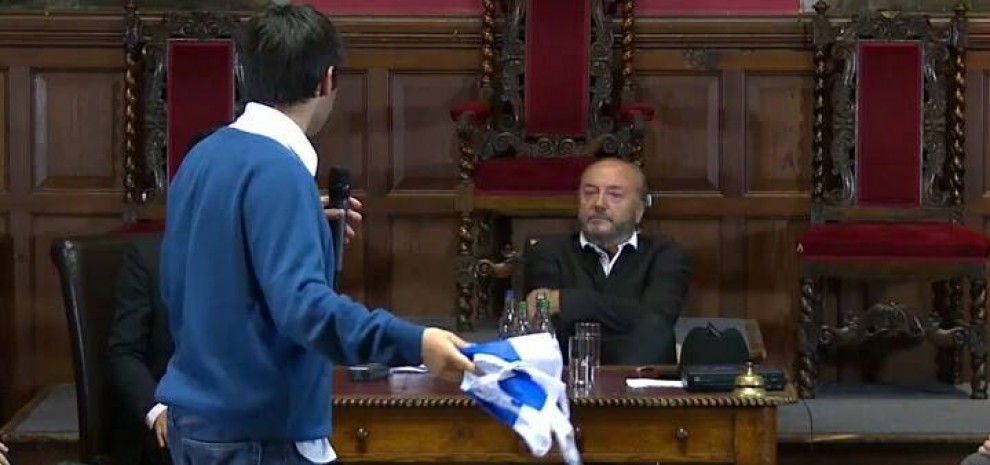The reputation of the Jewish community was dragged through the gutter at last night’s book launch of The Battle for Public Opinion in Europe: Changing Perceptions of the Palestine-Israel Conflict. The event was staged by anti-Israel pressure group Middle East Monitor at the University of London’s Senate House.
The panelists were Tim Llewellyn (former BBC Middle East correspondent and now adviser to Council for the Advancement of Arab-British Understanding), Jackie Rowland (Al Jazeera correspondent) and Seumas Milne (The Guardian associate editor). Yasmin Alibhai-Browne (The Independent) chaired the event.
Llewellyn and Rowland described a persistent manipulation of the British broadcast media by a well-moneyed pro-Jewish lobby. Llewellyn said, inter alia, that:
“The BBC is very sparing in the amount of delegations or visitors it allows from the Palestinian side. Whereas from remarks that have been heard from the head of BBC News, Helen Boaden, the British Board of Deputies (of British Jews), for example, practically lives at the BBC. They’re there all the time.”
And:
“I was there (at the BBC) when we weren’t interfered with. But the last 10-12 years, since the beginning of the second Intifada, has coincided with Israel’s decision to mount a tremendously well organised, careful, assiduous and extremely well financed propaganda campaign in this country, especially in Britain.
The BBC has completely and utterly become feeble and has misreported, in my view; misrepresenting the situation in Israel-Palestine. It has done this maybe because of intense Israeli and pro-Israeli pressure from within this country, from political elements like the Friends of Israel of our three main political parties.
Also through the higher level of pro-Israel Zionists who are scattered at strategic points throughout the British establishment, throughout British business and among the people whose voices are respected.
The propaganda can sometimes be extremely intense, it can be bitter, it can be angry, it could be violent, it can be other forms of coercion. But it’s something the suits at the BBC find very hard to resist. So what has developed over the past 10 years at the BBC, and at other broadcasting institutions like ITN, not so much Channel 4, is a kind of self-censorship.
It is known now by the reporters if they are reporting on an atrocity by the Israelis, in the occupied territories or elsewhere, that they have to add on to the end of their story some kind of appeasing story of how terrible the Palestinians are or how the Israelis have suffered.”
And:
“The pressure of this Israeli campaign has had a tremendous effect, especially at the institutional level of the BBC and inside the political parties. These people are extremely tough, tough minded. I have just read a book by Anthony Lerman called The Making and Unmaking of a Zionist. If you studied the internecine warfare that goes on inside the Jewish community between the different groups; the anti-Zionists, the Zionists, the liberal Zionists, the non-Zionists, it is vitriolic, it is dreadful, I mean what chance have we got outside that community.”
Llewellyn even described Jews as “an alien people”. He said:
“The situation in Palestine now is the direct result of British deviousness, betrayal…dividing Syria in at least three parts; Lebanon, Syria as it is now, and Palestine, and setting the stage for the imposition and the implanting of an alien country, an alien people in that region.”
Rowland described how the BBC’s obligation for accountability, because it is publicly funded, has been “used and exploited by very well organised pro-Israeli, pro-Jewish lobby groups.”
She said that she knew someone who worked in the complaints department of the BBC who told her “that 85% of the complaints he dealt with were complaints by pro-Israeli, pro-Jewish lobby groups complaining about the perceived bias of the BBC’s Middle East coverage.”
She said this gives an idea of “how well organised, well funded people use the idea of public accountability to tie up a lot of BBC resources on one very narrow focus.”
Alibhai-Browne told of how she had been given a rent free home in England by Professor Hugh Blaschko for seven years after she fled Uganda and how he had said to her that “Israel will bring the worst out in us Jewish people”.
Alibahi-Browne also compared Israel to apartheid South Africa.
Milne said “there are well funded and well organised organisations that campaign in support of Israel. If you’re editing in these area you will find pressure and campaigning constantly by those groups.”
During the Q&A I couldn’t resist mentioning, seeing she was in the audience, that I took the footage that contributed to Jenny Tonge’s exit from the Liberal Democrats. In a bizarre outburst right at the end she took to the microphone to announce:
“I’d like to say, I hope he hasn’t gone, a big, big ‘thank you’ to Richard Millett, the Jewish Chronicle, the Board of Deputies of British Jews and the entire pro-Israel lobby who have relentlessly attacked me for eight years but making sure that the Palestinian cause gets heard.”
I have no problem at all with the Palestinian cause getting heard. The main problem for the Palestinians is that it is heard via the likes of Tonge, Milne, Rowland, Alibhai-Browne and Llewellyn.
Meanwhile, it will be interesting to clarify exactly what Helen Boaden did say that led to Llewellyn’s accusation that the Board of Deputies of British Jews “practically lives at the BBC”.
Click HERE for Jonathan Hoffman’s view of last night.
Click HERE for MEMO’s version with photos.




